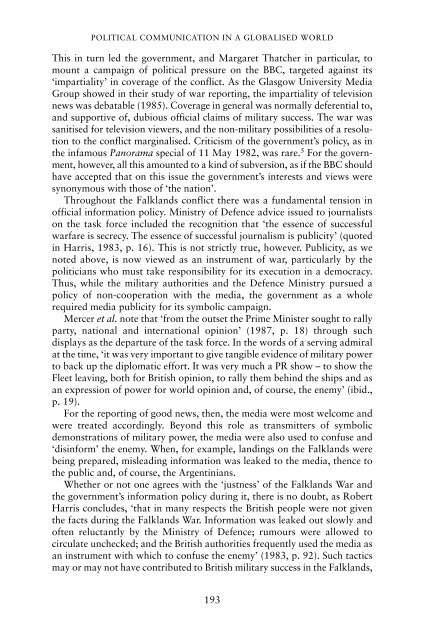20130412164339753295_book_an-introduction-to-political-communication
20130412164339753295_book_an-introduction-to-political-communication
20130412164339753295_book_an-introduction-to-political-communication
Create successful ePaper yourself
Turn your PDF publications into a flip-book with our unique Google optimized e-Paper software.
POLITICAL COMMUNICATION IN A GLOBALISED WORLD<br />
This in turn led the government, <strong>an</strong>d Margaret Thatcher in particular, <strong>to</strong><br />
mount a campaign of <strong>political</strong> pressure on the BBC, targeted against its<br />
‘impartiality’ in coverage of the conflict. As the Glasgow University Media<br />
Group showed in their study of war reporting, the impartiality of television<br />
news was debatable (1985). Coverage in general was normally deferential <strong>to</strong>,<br />
<strong>an</strong>d supportive of, dubious official claims of military success. The war was<br />
s<strong>an</strong>itised for television viewers, <strong>an</strong>d the non-military possibilities of a resolution<br />
<strong>to</strong> the conflict marginalised. Criticism of the government’s policy, as in<br />
the infamous P<strong>an</strong>orama special of 11 May 1982, was rare. 5 For the government,<br />
however, all this amounted <strong>to</strong> a kind of subversion, as if the BBC should<br />
have accepted that on this issue the government’s interests <strong>an</strong>d views were<br />
synonymous with those of ‘the nation’.<br />
Throughout the Falkl<strong>an</strong>ds conflict there was a fundamental tension in<br />
official information policy. Ministry of Defence advice issued <strong>to</strong> journalists<br />
on the task force included the recognition that ‘the essence of successful<br />
warfare is secrecy. The essence of successful journalism is publicity’ (quoted<br />
in Harris, 1983, p. 16). This is not strictly true, however. Publicity, as we<br />
noted above, is now viewed as <strong>an</strong> instrument of war, particularly by the<br />
politici<strong>an</strong>s who must take responsibility for its execution in a democracy.<br />
Thus, while the military authorities <strong>an</strong>d the Defence Ministry pursued a<br />
policy of non-cooperation with the media, the government as a whole<br />
required media publicity for its symbolic campaign.<br />
Mercer et al. note that ‘from the outset the Prime Minister sought <strong>to</strong> rally<br />
party, national <strong>an</strong>d international opinion’ (1987, p. 18) through such<br />
displays as the departure of the task force. In the words of a serving admiral<br />
at the time, ‘it was very import<strong>an</strong>t <strong>to</strong> give t<strong>an</strong>gible evidence of military power<br />
<strong>to</strong> back up the diplomatic effort. It was very much a PR show – <strong>to</strong> show the<br />
Fleet leaving, both for British opinion, <strong>to</strong> rally them behind the ships <strong>an</strong>d as<br />
<strong>an</strong> expression of power for world opinion <strong>an</strong>d, of course, the enemy’ (ibid.,<br />
p. 19).<br />
For the reporting of good news, then, the media were most welcome <strong>an</strong>d<br />
were treated accordingly. Beyond this role as tr<strong>an</strong>smitters of symbolic<br />
demonstrations of military power, the media were also used <strong>to</strong> confuse <strong>an</strong>d<br />
‘disinform’ the enemy. When, for example, l<strong>an</strong>dings on the Falkl<strong>an</strong>ds were<br />
being prepared, misleading information was leaked <strong>to</strong> the media, thence <strong>to</strong><br />
the public <strong>an</strong>d, of course, the Argentini<strong>an</strong>s.<br />
Whether or not one agrees with the ‘justness’ of the Falkl<strong>an</strong>ds War <strong>an</strong>d<br />
the government’s information policy during it, there is no doubt, as Robert<br />
Harris concludes, ‘that in m<strong>an</strong>y respects the British people were not given<br />
the facts during the Falkl<strong>an</strong>ds War. Information was leaked out slowly <strong>an</strong>d<br />
often reluct<strong>an</strong>tly by the Ministry of Defence; rumours were allowed <strong>to</strong><br />
circulate unchecked; <strong>an</strong>d the British authorities frequently used the media as<br />
<strong>an</strong> instrument with which <strong>to</strong> confuse the enemy’ (1983, p. 92). Such tactics<br />
may or may not have contributed <strong>to</strong> British military success in the Falkl<strong>an</strong>ds,<br />
193
















